PRINCETON, NJ -- This analysis focuses on the relationship between religious identification and church attendance and the belief that the Iraq war was a mistake. In order to provide large and stable sample sizes, the analysis utilizes a combination of Gallup surveys conducted in 2005 and early 2006, which included the "war is a mistake" question and also questions about respondents' religions. The dates of interviewing for these surveys stretch from January 2005 through February 2006.
Below are the major findings.
1. Protestants and other Christians are most supportive of the Iraq war, Catholics are slightly less supportive, and those with other, non-Christian religions and those with no religion are the least supportive.
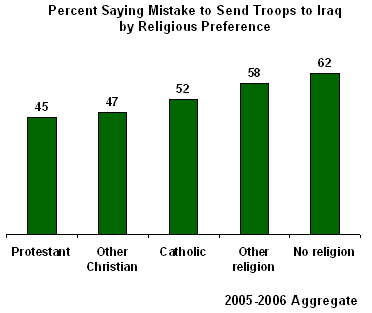
Less than half of Protestants and other Christians in this large sample say that the war in Iraq was a mistake. Slightly more than half of Catholics say the war was a mistake, and roughly 6 out of 10 of those who have a non-Christian religion and who have no religion at all gave this response.
2. In general, black Americans are strongly opposed to the war in Iraq and are highly likely to say that it was a mistake. Black Americans are also highly religious and strongly likely to be Protestant or some other Christian affiliation. The following graph, therefore, looks at the relationship between religious preference and belief that the war was a mistake among whites:
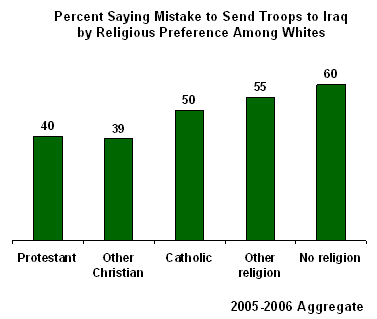
As would be expected, the basic relationships are the same among the sample of whites as for the total sample, although slightly lower levels of percentages in each group of whites say the war was a mistake. Four out of 10 white Protestants and other Christians say the war was a mistake, a percentage that climbs to 50% among white Catholics, 55% among those with a non-Christian religion, and 60% among those with no religion.
3. There is a significant relationship between religious identification and party identification. Protestants tend to be Republicans, Catholics are more mixed, and those with no religion are significantly less likely to be Republicans and more likely to be independents than the general American population. Therefore, some of the explanation for the finding that certain religious groups are more likely to believe the Iraq war was a mistake is logically a reflection of this partisan pattern.
The graph below represents the percentage saying the war was a mistake broken out by party identification within each of three major religious groups (sample size limitations restricted the use of the "other Christian" and "other religion" groups in this analysis).
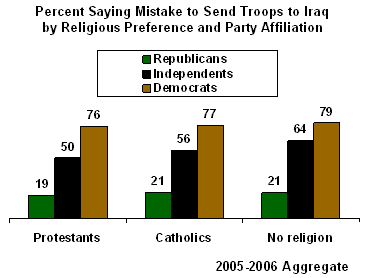
The very strong relationship between party and views on the Iraq war is evident within each of these three religious groups. Democrats are highly likely to believe the war was a mistake, independents are in the middle, and Republicans are least likely to believe the war was a mistake.
There is little difference among Republicans and Democrats across the three groups. In other words, for those who identify with the two major parties, religious identification appears to make little additional difference in their views on the war.
On the other hand, independents who are Catholic, and in particular those who have no religion, are more likely to believe the war was a mistake than independents who are Protestants.
4. There is a significant relationship between self-reported frequency of church attendance and belief that the Iraq war was a mistake. In general, the more frequently an American attends church, the less likely he or she is to say the war was a mistake:
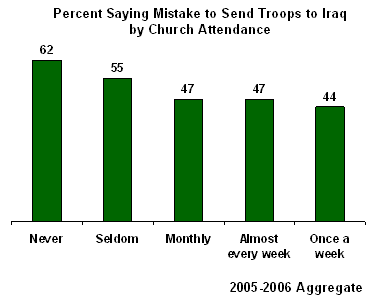
The biggest difference appears between those who attend church seldom or never, and those who attend monthly or more often. Well over half of infrequent churchgoers say the war is a mistake, while less than half of more frequent churchgoers agree. The range is 18 percentage points between the high point of 62% of those who never attend church and say the war is a mistake, and 44% of those who attend every week who say the war is a mistake.
5. Does frequency of church attendance make a difference in attitudes toward the war above and beyond the impact of religious affiliation? The graph below displays the "mistake" percentage within each church group divided into those who attend church monthly or more often, and those who attend seldom or never.
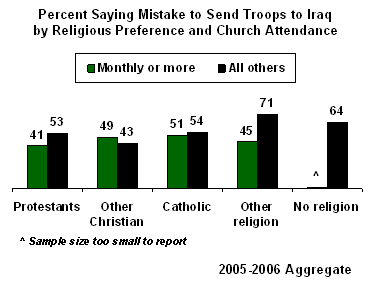
The patterns are generally predictable. Among Protestants, Catholics, and those who identify with another religion, those who attend church seldom or never are most likely to perceive the war as a mistake. The pattern among other Christians, however, is in the opposite direction. (The sample size of those with no religion who attend church monthly or more often was too small to include.)
6. In America today there is a strong and persistent relationship between religiosity and party identification. The more religious the American, in general, the more likely he or she is to identify with the Republican Party. Frequent churchgoers tend to be Republicans, who in turn can be expected to support the policies of a Republican president who started the Iraq war.
The graph below displays the relationship between church attendance and belief that the war was a mistake within each of the three major partisan groups: Republican, independent, and Democrat:
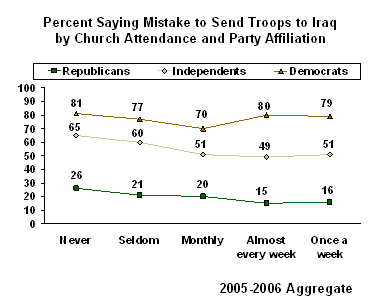
The data once again underscore the degree to which party identification is overwhelmingly correlated with views on the Iraq war. Regardless of church attendance, Democrats are highly likely to say the war was a mistake, Republicans are highly unlikely to say that the war was a mistake, and independents are somewhere in the middle.
There is, however, still a modest relationship between church attendance and views on the war within both Republican and independent groups.
Republicans who never attend church are 10 percentage points more likely to say that the war was a mistake than those who attend once a week.
The relationship is a little stronger among independents, ranging from 65% of those who never attend church and say the war was a mistake to 51% of independents who attend weekly.
There is no strong pattern among Democrats. Both those who rarely attend and those who attend frequently are the most likely to say the war was a mistake; those who attend monthly are least likely to say that the war was a mistake.
7. The graph below displays the same pattern among whites only.
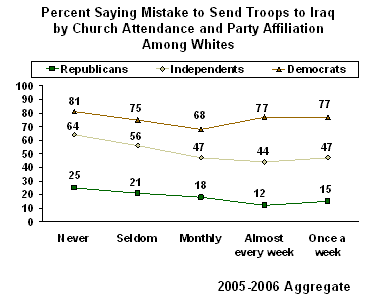
The same basic patterns occur among whites, with a slightly higher correlation between church attendance and the "mistake" percentage among independents than was evident for the total sample. The range among white independents is between 64% who never attend church and say the war was a mistake to 44% and 47% of those who attend church almost every week or every week, respectively.
Summary
Americans' religious preference and frequency of church attendance are related to the belief that the war in Iraq was a mistake. Those who have a non-Christian religious identification or no religious identification at all and those who seldom or never attend church are most likely to believe that the war was a mistake. Those who are Protestants or other Christians, and those who attend church frequently are least likely to believe that the war was a mistake.
Part of the explanation for these findings is the strong relationship between party identification and both religious identification and frequency of church attendance. Protestants and other non-Catholic Christians tend to be disproportionately Republican, as are those who attend church frequently. Analysis shows, however, that the relationship between church attendance and belief that the war was a mistake persists even when Republicans and independents are isolated as groups. The relationship between church attendance and the belief that the war was a mistake is less evident among Democrats.
Survey Methods
Results are based on aggregated nationwide surveys of adults, aged 18 and older, conducted by Gallup between January 2005 and February 2006. The sample sizes involved in the analyses above vary depending on the variables involved, but in all cases involved random samples of at least 4000 respondents. For results based on samples of this size or larger, one can say with 95% confidence that the margin of error due to sampling and other random effects is ±2 percentage points or less.
In addition to sampling error, question wording and practical difficulties in conducting surveys can introduce error or bias into the findings of public opinion polls.